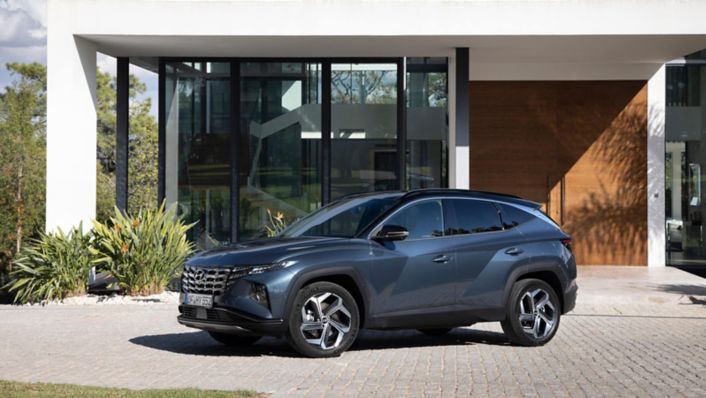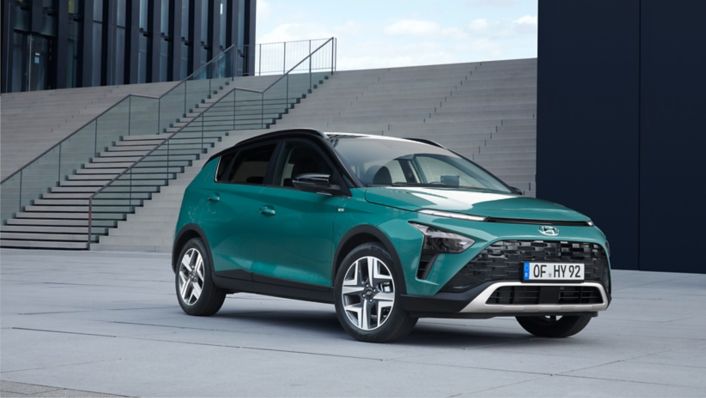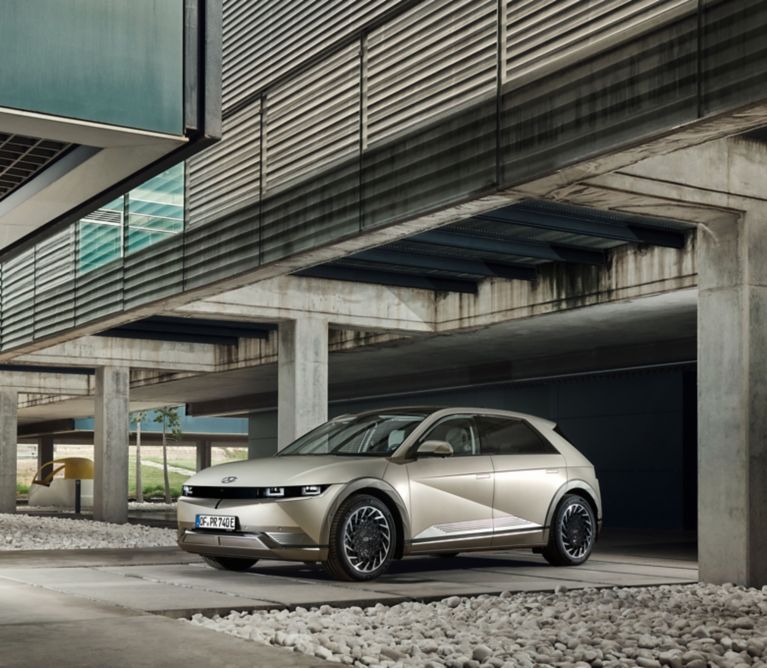The all-new Hyundai TUCSON and IONIQ 5 both received the maximum five-star overall rating in the Euro NCAP safety test
BAYON achieved a four-star rating after its Euro NCAP testing
Hyundai Motor equips its models with Smart Sense active safety and driving technologies
Press material
-
Download
-
Images
With the all-new TUCSON, IONIQ 5, and BAYON, three new Hyundai models have received top ratings from the independent vehicle assessment organisation European New Car Assessment Programme (Euro NCAP). Both TUCSON and IONIQ 5 achieved the maximum five-star safety rating while BAYON was given a rating of four stars.
Vehicles undergoing Euro NCAP’s safety test are evaluated on the following four categories: ‘adult occupant’, ‘child occupant’, ‘vulnerable road user’ and ‘safety assist’. The five-star-rated Hyundai TUCSON performed particularly well across ‘adult occupant’ and ‘child occupant’. IONIQ 5 also excelled in these categories as well as ‘safety assist’. In its assessment, BAYON performed particularly well in the ‘child occupant’ category.
Test results TUCSON (PDF)
Test results IONIQ 5 (PDF)
Test results BAYON (PDF)
The fact that TUCSON and IONIQ 5 have both achieved the maximum five-star safety rating from Euro NCAP serves as evidence that not only is Hyundai a leader in future mobility, but our models are among the safest automobiles in Europe. These Euro NCAP ratings show that Hyundai is committed to guaranteeing our customers as well as other road users a high level of safety and technology-driven mobility solutions.
Smart Sense: Hyundai’s suite of safety features
Hyundai models are equipped with Hyundai Smart Sense active safety and driving assistance features. In addition to its seven-airbag system enhanced to keep front-seat passengers even safer, the all-new TUCSON’s upgraded safety package now includes Highway Driving Assist (HDA), Blind-spot View Monitor (BVM), Blind-spot Collision-avoidance Assist (BCA), and Forward Collision-Avoidance Assist (FCA). On the motorway, HDA helps TUCSON regulate the speed, maintain the distance to the car in front, and keep in its lane. BVM shows the rear view in the cluster when the turn signal is used. BCA monitors rear corners and alerts the drivers when another vehicle is detected, applying differential braking when necessary. FCA autonomously brakes to avoid collisions with cars, pedestrians, and cyclists. The feature now includes Junction Turning, expanding the range of protection to include preventing collisions at intersections while turning left.

IONIQ 5 is the first Hyundai model to offer Highway Driving Assist 2 (HDA 2). HDA 2 makes driving on the motorway more convenient by combining Navigation-based Smart Cruise Control (NSCC) and Lane Following Assist (LFA) and utilising Level 2 autonomous driving capabilities. The feature uses the front view camera, radar sensors, and navigation data to control the speed, direction, and following distance as well as help the driver change lanes.
Like the other members of the Hyundai SUV family, BAYON prioritises safety, coming standard with an extensive list of Smart Sense features. In addition to safer motorway driving, Driver Attention Warning (DAW) can warn the driver when drowsy or distracted driving is detected. Leading Vehicle Departure Alert (LVDA) alerts the driver when do not react quickly enough to the vehicle ahead of them moving forward.

Hyundai has been producing models that have regularly received Euro NCAP’s top safety rating. With the most recent additions being TUCSON and IONIQ 5, former Hyundai models that have earned the maximum five-star rating include the i30, KONA, SANTA FE, IONIQ, and NEXO.
About Euro NCAP
Euro NCAP organises crash and safety tests on new vehicles and provides motoring consumers with a realistic and independent assessment of the safety performance of some of the most popular cars sold in Europe. Established in 1997 and backed by several European Governments, motoring, consumer and insurance organisations, Euro NCAP has rapidly become a catalyst for encouraging significant safety improvements to new car design.
Disclaimer: CO2 and emissions data
Fuel consumption combined for the Hyundai TUCSON 1.6 T-GDI 48V (150 PS) with 6iMT 2WD in l/100 km: 6.8 - 6.5; CO2 emissions combined in g/km: 154 - 147 (WLTP)
Fuel consumption combined for the Hyundai TUCSON 1.6 T-GDI 48V (150 PS) with 7DCT 2WD in l/100 km: 6.6 - 6.3; CO2 emissions combined in g/km: 150 - 143 (WLTP)
Fuel consumption combined for the Hyundai TUCSON 1.6 T-GDI 48V (180 PS) with 6iMT 2WD in l/100 km: 6.7 - 6.4; CO2 emissions combined in g/km: 152 - 145 (WLTP)
Fuel consumption combined for the Hyundai TUCSON 1.6 T-GDI 48V (180 PS) with 7DCT 4WD in l/100 km: 7.1 - 6.9; CO2 emissions combined in g/km: 162 - 156 (WLTP)
Fuel consumption combined for the Hyundai TUCSON 1.6 CRDi 48V (136 PS) with 6iMT 2WD in l/100 km: 5.3 - 5.0; CO2 emissions combined in g/km: 140 - 130 (WLTP)
Fuel consumption combined for the Hyundai TUCSON 1.6 CRDi 48V (136 PS) with 7DCT 2WD in l/100 km: 5.6 - 5.2; CO2 emissions combined in g/km: 146 - 137 (WLTP)
Fuel consumption combined for the Hyundai TUCSON 1.6 CRDi 48V (136 PS) with 7DCT 4WD in l/100 km: 6.0 - 5.7; CO2 emissions combined in g/km: 158 - 149 (WLTP)
Fuel consumption combined for the Hyundai TUCSON 1.6 T-GDI (150 PS) with 6MT 2WD in l/100 km: 7.0 - 6.6; CO2 emissions combined in g/km: 159 - 150 (WLTP)
Fuel consumption combined for the Hyundai TUCSON 1.6 T-GDI (150 PS) with 6MT 4WD in l/100 km: 7.8 - 7.3; CO2 emissions combined in g/km: 178 - 165 (WLTP)
Fuel consumption combined for the Hyundai TUCSON 1.6 CRDi (115 PS) with 6MT 2WD in l/100 km: 5.6 - 5.2; CO2 emissions combined in g/km: 146 - 137 (WLTP)
Fuel consumption combined for the Hyundai TUCSON 1.6 T-GDI Hybrid with 6AT 2WD in l/100 km: 5.9 - 5.5; CO2 emissions combined in g/km: 135 - 125 (WLTP)
Fuel consumption combined for the Hyundai TUCSON 1.6 T-GDI Hybrid with 6AT 4WD in l/100 km: 6.6 - 6.2; CO2 emissions combined in g/km: 149 - 140 (WLTP)
Fuel consumption combined for the Hyundai TUCSON 1.6 T-GDI Plug-in Hybrid with 6AT 4WD in l/100 km: 1.4; CO2 emissions combined in g/km: 31 (WLTP)
Electricity consumption combined for the Hyundai IONIQ 5 58 kWh with 2WD in kWh/100 km: 16.7; CO2 emissions combined in g/km: 0 (WLTP)
Electricity consumption combined for the Hyundai IONIQ 5 58 kWh with 4WD in kWh/100 km: 18.1; CO2 emissions combined in g/km: 0 (WLTP)
Electricity consumption combined for the Hyundai IONIQ 5 72.6 kWh (19” alloy rims) with 2WD in kWh/100 km: 16.8; CO2 emissions combined in g/km: 0 (WLTP)
Electricity consumption combined for the Hyundai IONIQ 5 72.6 kWh (20” alloy rims) with 2WD in kWh/100 km: 17.9; CO2 emissions combined in g/km: 0 (WLTP)
Electricity consumption combined for the Hyundai IONIQ 5 72.6 kWh (19” alloy rims) with 4WD in kWh/100 km: 17.7; CO2 emissions combined in g/km: 0 (WLTP)
Electricity consumption combined for the Hyundai IONIQ 5 72.6 kWh (20” alloy rims) with 4WD in kWh/100 km: 19.0; CO2 emissions combined in g/km: 0 (WLTP)
Fuel consumption combined for the Hyundai BAYON 1.2 MPi (84 PS) with 5MT in l/100 km: 5.7 - 5.4; CO2 emissions combined in g/km: 129 - 124 (WLTP)
Fuel consumption combined for the Hyundai BAYON 1.0 T-GDI (100 PS) with 6MT in l/100 km: 5.6 - 5.3; CO2 emissions combined in g/km: 129 - 122 (WLTP)
Fuel consumption combined for the Hyundai BAYON 1.0 T-GDI (100 PS) with 7DCT in l/100 km: 5.6 - 5.3; CO2 emissions combined in g/km: 128 - 122 (WLTP)
Fuel consumption combined for the Hyundai BAYON 1.0 T-GDI 48V (100 PS) with 6iMT in l/100 km: 5.5 - 5.2; CO2 emissions combined in g/km: 125 - 118 (WLTP)
Fuel consumption combined for the Hyundai BAYON 1.0 T-GDI 48V (100 PS) with 7DCT in l/100 km: 5.4 - 5.2; CO2 emissions combined in g/km: 124 - 118 (WLTP)
Fuel consumption combined for the Hyundai BAYON 1.0 T-GDI 48V (120 PS) with 6iMT in l/100 km: 5.5 - 5.2; CO2 emissions combined in g/km: 125 - 118 (WLTP)
Fuel consumption combined for the Hyundai BAYON 1.0 T-GDI 48V (120 PS) with 7DCT in l/100 km: 5.4 - 5.2; CO2 emissions combined in g/km: 124 - 118 (WLTP)
Fuel consumption combined for the Hyundai BAYON Kappa 1.4 with 6MT in l/100 km: 6.2; CO2 emissions combined in g/km: 142 (WLTP)
Fuel consumption combined for the Hyundai BAYON Kappa 1.4 with 6AT in l/100 km: 6.4; CO2 emissions combined in g/km: 147 (WLTP)













